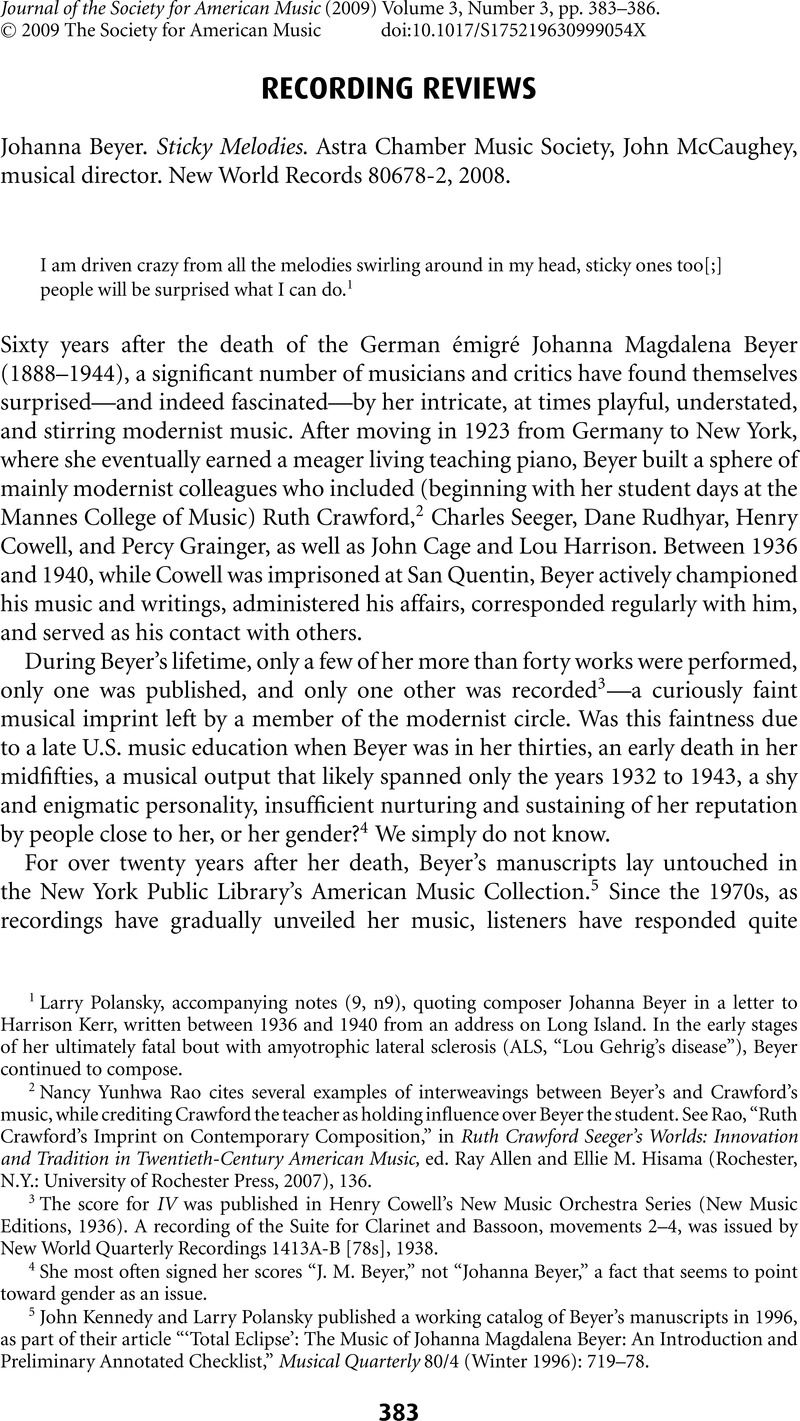No CrossRef data available.
Published online by Cambridge University Press: 01 August 2009

1 Larry Polansky, accompanying notes (9, n9), quoting composer Johanna Beyer in a letter to Harrison Kerr, written between 1936 and 1940 from an address on Long Island. In the early stages of her ultimately fatal bout with amyotrophic lateral sclerosis (ALS, “Lou Gehrig's disease”), Beyer continued to compose.
2 Nancy Yunhwa Rao cites several examples of interweavings between Beyer's and Crawford's music, while crediting Crawford the teacher as holding influence over Beyer the student. See Rao, “Ruth Crawford's Imprint on Contemporary Composition,” in Ruth Crawford Seeger's Worlds: Innovation and Tradition in Twentieth-Century American Music, ed. Ray Allen and Ellie M. Hisama (Rochester, N.Y.: University of Rochester Press, 2007), 136.
3 The score for IV was published in Henry Cowell's New Music Orchestra Series (New Music Editions, 1936). A recording of the Suite for Clarinet and Bassoon, movements 2–4, was issued by New World Quarterly Recordings 1413A-B [78s], 1938.
4 She most often signed her scores “J. M. Beyer,” not “Johanna Beyer,” a fact that seems to point toward gender as an issue.
5 John Kennedy and Larry Polansky published a working catalog of Beyer's manuscripts in 1996, as part of their article “‘Total Eclipse’: The Music of Johanna Magdalena Beyer: An Introduction and Preliminary Annotated Checklist,” Musical Quarterly 80/4 (Winter 1996): 719–78.
6 Champions of Beyer's music include Charles Amirkhanian, Larry Polansky, John Kennedy, Sarah Cahill, and John McCaughey.
7 “Music of the Spheres,” incidental music for a now missing pageant Status Quo (1938), performed by the Electronic Weasel Ensemble, on New Music for Electronic and Recorded Media: Women in Electronic Music, 1977 (later remastered as CRI CD 728, 1997), and reissued by New World Records (NWR 80653, 2006).
8 Performed by Essential Music, The Aerial no. 3 (Non Sequitur Recordings), also appearing in 2004 on Historic Works for Percussion Ensemble (1931–1942) (Equilibrium CD62).
9 Sarah Cahill, piano, Crawford Seeger: Nine Preludes, Piano Study in Mixed Accents; Beyer: Dissonant Counterpoint, Gebrauchs-Musik (New Albion NA114CD, 2001, recorded in 1999). For a description of dissonant counterpoint, see Charles Seeger, “On Dissonant Counterpoint,” Modern Music 7/4 (June-July 1930): 25–26. In addition to Seeger and Crawford, other composers—including Henry Brant, Henry Cowell, Lou Harrison, Dane Rudhyar, Carl Ruggles, and Arnold Schoenberg—wrote dissonant counterpoint.
10 Two years earlier, New World Records released the first recording of Beyer's chamber music, the three-movement Suite for Violin and Piano, 1937, on Works for Violin by George Antheil, Johanna Beyer, Henry Cowell, Ruth Crawford, Charles Dodge, David Mahler, Larry Polansky, Stefan Wolpe (NWR 80641, 2006).
11 Beyer also translated into German Sandburg's poem “Prayers of Steel” for Ruth Crawford, who set it to music in 1932.
12 “The Main Deep,” first of Three Pieces for Choir, quoted by Polansky in the accompanying notes, 21.